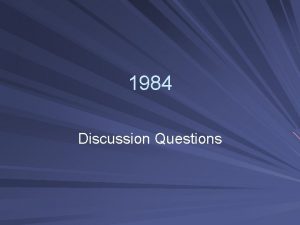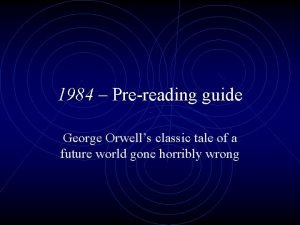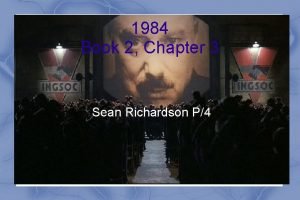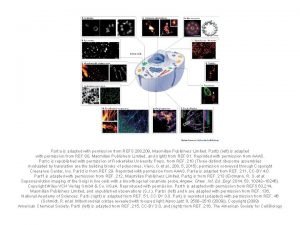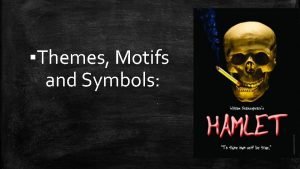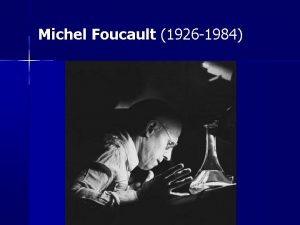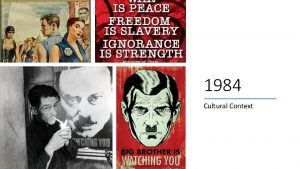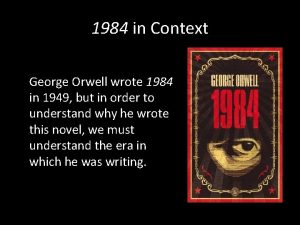1984 QUOTES THEMES AND DISCUSSION QUESTIONS ADAPTED FROM












- Slides: 12

1984 – QUOTES, THEMES, AND DISCUSSION QUESTIONS ADAPTED FROM http: //www. shmoop. com/1984

QUOTE - POWER The Party seeks power entirely for its own sake. We are not interested in the good of others; we are interested solely in power. Not wealth or luxury or long life or happiness: only power, pure power. What pure power means you will understand presently. We are different from all the oligarchies of the past, in that we know what we are doing. All the others, even those who resembled ourselves, werecowards and hypocrites. The German Nazis and the Russian Communists came very close to us in their methods, but they never had the courage to recognize their own motives. They pretended, perhaps they even believed, that they had seized power unwillingly and for a limited time, and that just round the corner there lay a paradise where human beings would be free and equal. We are not like that. We know that no one ever seizes power with the intention of relinquishing it. Power is not a means, it is an end. One does not establish a dictatorship in order to safeguard a revolution; one makes the revolution in order to establish the dictatorship. The object of persecution is persecution. The object of torture is torture. The object of power is power. Now do you begin to understand me? " (3. 3. 14, O’Brien)

THEME – POWER 1984 is not just about totalitarianism; it makes us live through totalitarianism. The Party wants power for its own sake. The Party carefully monitors the behavior of all of its constituents. Morning group exercises are mandatory. The Party demands that all loyalty created in private be severed, and that the only acceptable loyalty is loyalty to the Party. The Party condemns sex, and brainwashes its constituents. The Party recognizes no concept of a "family" other than the collective family under rule by the Party. The Party controls everything – the past, the present, and the future – by controlling historical records, language, and even thought. The Party tortures and "vaporizes" those who harbor rebellious thoughts. The state suffers through constant warfare. The conditions are dilapidated, but the citizens do not know better. Classism exists everywhere, and different classes generally do not socialize with each other. 1. What are the different ways that the Party obtains and maintains power in Oceania? Which is the most potent? 2. What does it mean to want power for power’s sake? Is this what the Party does? What is power good for, anyway, other than to gain other things such as money, control, and even more power? 3. What are some of the rights confiscated altogether by the Party? 4. What is the most difficult for Winston to lose? 5. How does the Party’s propaganda indoctrinate and control thought? 6. In what similar ways is power handled in our current society to the way it is handled in the world of 1984?

QUOTE – LANGUAGE By 2050, earlier, probably – all real knowledge of Oldspeak will have disappeared. The whole literature of the past will have been destroyed. Chaucer, Shakespeare, Milton, Byron – they'll exist only in Newspeak versions, not merely changed into something different, but actually changed into something contradictory of what they used to be. Even the literature of the Party will change. Even the slogans will change. How could you have a slogan like ‘freedom is slavery’ when the concept of freedom has been abolished? The whole climate of thought will be different. In fact there will be no thought, as we understand it now. Orthodoxy means not thinking – not needing to think. Orthodoxy is unconsciousness. " (1. 5. 30, Syme)

THEME – LANGUAGE In 1984, language is of central importance to behavior control. The major proposition is that if control of language were centralized in a state, then the possibility of rebellion or disobedience would be eliminated. This book devotes significant time to examining the centrality of language – explicitly, through Goldstein’s manifesto, or contextually, as in when Syme and Winston speak of the Newspeak dictionary – to history, culture, life, behavior, thoughts, concepts, and power. 1. Can you really narrow the range of thought by narrowing vocabulary, as the Party seeks to do? What does that mean for people with small vocabularies – would they think less? Why does the Party think so? Can you think of counterexamples to the Party’s proposition? 2. What is the role of synonyms and antonyms in language, if, as Syme and Winston reasoned, all they are good for is taking up space in the dictionary? 3. Even if people communicate solely in Newspeak, and the control of language is centralized in Oceania by the Party, it would not be possible to narrow the range of thought to eliminate the possibility of subversion. Therefore, the Party’s ambitions are impossible. Do you agree or disagree? 4. Language limits thought, and thought is dependent on language. Indeed, no thought can be had without the right words with which to express it. Therefore, the Party’s ambitions are attainable. Do you agree or disagree with this statement? Is it possible to limit language and thought in our current society? Is it happening?

QUOTES –MANIPULATION Very likely the confessions had been rewritten and rewritten until the original facts and dates no longer had the smallest significance. The past not only changed, but changed continuously. What most afflicted him with the sense of nightmare was that he had never clearly understood why the huge imposture was undertaken. The immediate advantages of falsifying the past were obvious, but the ultimate motive was mysterious. He took up his pen again and wrote: I understand HOW: I do not understand WHY. (1. 7. 24 -25, Winston) Winston does not understand the ultimate motive behind the Party’s control and falsification of records. […] he was not troubled by the fact that every word he murmured into the speakwrite, every stroke of his inkpencil, was a deliberate lie. He was as anxious as anyone else in the Department that the forgery should be perfect […] A mighty deed, which could never be mentioned, had been achieved. It was now impossible for any human being to prove by documentary evidence that the war with Eurasia had ever happened. (2. 9. 8) During Hate Week, Winston’s duties consist of editing and rewriting history with respect to the announcement of Oceania’s new enemy, Eastasia. He is not troubled by his deliberate lying in furtherance of the Party’s goals, but rather proud of the horrendous deed in which he participates.

THEME – MANIPULATION The Party seeks to control everything – past, present, and future. Its first effort toward attaining that goal is to control and manipulate every source of information, rewriting and modifying the content of all historical records and other documentary evidence for its own gain. The Party forbids its members to keep written records of their lives, and mandates that any photographs or documents be destroyed through "memory holes" placed throughout Oceania. Since memory is unreliable, over time, reality becomes fuzzy at best, and citizens are soon willing to believe whatever the Party informs them. Thus, the Party manipulates the past in order to control the present. 1. Manipulation and control sure seem to be the main concerns of the Party here. How evil is that? But is the Party inherently evil for its goals, or is it the way in which it accomplishes those goals that is the problem? 2. Legally speaking, toiling with records and evidence is called "spoliation" and is punishable as perjury and contempt. Too bad there’s no government around to enforce this kind of law. But this brings up an interesting question: What do you make of the fact that the government of Oceania seems to have no one to answer to? Do "laws" and "rules" lose their meaning in 1984? What about "justice? “ 3. Although the Party seeks to control everything by manipulating every source of information, ultimately it is unable to achieve that goal because that manipulation is overpowered by the unalterable nature of its people’s collective memory. Do you agree or disagree with this statement. 4. In our current society how do we manipulate information? In what ways are we manipulated as in the world of 1984? Is manipulation worse in our current society?

QUOTES – REPRESSION The youthful body was strained against his own, the mass of dark hair was against his face, and yes! Actually she had turned her face up and he was kissing the wide red mouth. She had clasped her arms about his neck, she was calling him darling, precious one, loved one. He had pulled her down on to the ground, she was utterly unresisting, he could do what he liked with her. But the truth was that he had no physical sensation, except that of mere contact. All he felt was incredulity and pride. He was glad that this was happening, but he had no physical desire. It was too soon, her youth and prettiness had frightened him, he was too much used to living without women – he did not know the reason. (2. 2. 16) After living in such a repressed society, Winston’s physical functions are at first rusty when finally confronted with a lusty situation. "I've been at school too, dear. Sex talks once a month for the over-sixteens. And in the Youth Movement. They rub it into you for years. I dare say it works in a lot of cases. But of course you can never tell; people are such hypocrites. " (2. 3. 24, Julia) Female Party members have been brainwashed since childhood about the importance of chastity as manifestation of one’s loyalty to the Party.

QUOTES – REPRESSION Unlike Winston, she had grasped the inner meaning of the Party's sexual puritanism. It was not merely that the sex instinct created a world of its own which was outside the Party's control and which therefore had to be destroyed if possible. What was more important was that sexual privation induced hysteria, which was desirable because it could be transformed into war-fever and leader-worship. The way she put it was: "When you make love you're using up energy; and afterwards you feel happy and don't give a damn for anything. They can't bear you to feel like that. They want you to be bursting with energy all the time. All this marching up and down and cheering and waving flags is simply sex gone sour. If you're happy inside yourself, why should you get excited about Big Brother and the Three-Year Plans and the Two Minutes Hate and all the rest of their bloody rot? “ That was very true, he thought. There was a direct intimate connection between chastity and political orthodoxy. For how could the fear, the hatred, and the lunatic credulity which the Party needed in its members be kept at the right pitch, except by bottling down some powerful instinct and using it as a driving force? The sex impulse was dangerous to the Party, and the Party had turned it to account. They had played a similar trick with the instinct of parenthood. The family could not actually be abolished, and, indeed, people were encouraged to be fond of their children, in almost the old-fashioned way. The children, on the other hand, were systematically turned against their parents and taught to spy on them and report their deviations. The family had become in effect an extension of the Thought Police. It was a device by means of which everyone could be surrounded night and day by informers who knew him intimately. (2. 3. 25 -27) Julia teaches Winston about her musings on the dangerous effects of sex on loyalty to the Party: The Party not only seeks to sever private loyalties in encouraging chastity, but also to control its constituents’ use of time by advocating the abolition of sex at all.

THEME – REPRESSION A successful totalitarian state cannot accommodate private loyalties, since private loyalties will often trump loyalty to the Party. Because sex and family create private loyalties, the Party must somehow control these social acts and constructs. Thus, the Party brainwashes children to believe that sex is despicable, unpleasurable, and merely a means to create new Party members. Chastity is encouraged, sexual drives become repressed, sex is seen as a "duty to the Party, " and all potential private loyalties are thus eliminated. 1. Does Julia’s sexual appetite seem normal? Why does the Party seek to repress it? 2. Do you believe the Party’s proposition that if people are no longer interested in sex, that they will devote all their energies to worshipping the Party? 3. Why does the Party view sex as dangerous and antithetical to its power? 4. Sexual repression is the Party’s most potent tool of power and control. Do you agree with this statement? 5. In what ways is there sexual repression in our society? Is it also a tool of power and control?

QUOTE – TECHNOLOGY You are the dead, " repeated the iron voice. "It was behind the picture, " breathed Julia. "It was behind the picture, " said the voice. "Remain exactly where you are. Make no movement until you are ordered. " It was starting, it was starting at last! They could do nothing except stand gazing into one another's eyes […] unthinkable to disobey the iron voice from the wall. There was a snap as though a catch had been turned back, and a crash of breaking glass. The picture had fallen to the floor uncovering the telescreen behind it. (2. 10. 2124) Winston and Julia come to a rude awakening when it turns out that their rented room has a hidden telescreen that has surveyed them for their entire affair. In general you could not assume that you were much safer in the country than in London. There were no telescreens, of course, but there was always the danger of concealed microphones by which your voice might be picked up and recognized; besides, it was not easy to make a journey by yourself without attracting attention. (2. 2. 2) Its reach not limited to telescreens, the Party also places hidden microphones throughout London to monitor the interactions of its constituents.

THEME – TECHNOLOGY Modernization in 1984 takes the form of technology, used for controlling means. By placing telescreens and clandestine microphones all across Oceania, the Party monitors its constituents 24/7. At work, in the comforts of their own home, even in the countryside or giant plazas and marketplaces, Oceanians cannot expect privacy. The Party’s use of advanced surveillance technology is only one of the methods it employs to ensure and ascertain control. 1. After all the reality TV shows that people willingly take part in, you’re probably thinking, well, what’s the big deal? After all, there’s even a show called Big Brother. So, what’s the big deal with being monitored 24/7? Is it a source of entertainment? Of control? How does surveillance function in 1984, specifically? In what ways is it similar to our current society? How does surveillance work in our society? Did Orwell predict what was going to happen in our current society? 2. How would the Party be weakened if it could not use surveillance in its citizens? 3. Is it possible to avoid invasion of privacy in the technological and surveillance society we live in today?
 Discussion questions 1984
Discussion questions 1984 Simple distillation discussion
Simple distillation discussion Winston's opinion of his workplace 1984
Winston's opinion of his workplace 1984 1984 pre reading questions
1984 pre reading questions 1984 book 2 chapter 3
1984 book 2 chapter 3 This passage is adapted from jane austen
This passage is adapted from jane austen How is a red blood cell adapted
How is a red blood cell adapted Adapted with permission from
Adapted with permission from In what ways have the highland maya adapted to modern life?
In what ways have the highland maya adapted to modern life? Xerophytic plants diagram
Xerophytic plants diagram Chaparral biome location
Chaparral biome location Structural adaptation of camel
Structural adaptation of camel Sausage shaped organelles
Sausage shaped organelles
